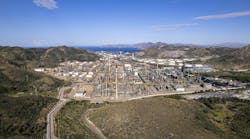Total SA has entered a special licensing agreement with Eni SPA for use of Eni Slurry Technology (EST), a proprietary refining process technology developed by the Italian operator to convert heavy, bottom-of-the-barrel feedstock into lighter, high-value products.
As part of the licensing deal, the companies have agreed to cooperate in a joint research and development project for EST, under which Eni will work together with Total to evaluate and tailor the technology to help meet Total’s specific requirements, the companies said in separate statements.
Total selected EST as part of an effort to keep its refineries competitive and economically viable amid ongoing market challenges facing the refining industry, especially those that have resulted from changing legislation and fuel specifications, according to Nathalie Brunelle, senior vice-president of strategy, development, and research for Total’s refining and chemicals segment.
In its yearend-2014 report to investors, Total said a major focus of its capital downstream investments would focus on improving competitiveness of its refining and petrochemical operations, including development of programs designed to maximize the value of heavy residues.
Earlier this year, the French operator announced it would spend €600 million to revitalize its refining business in France with projects that include an overhaul of the 220,000-b/d Donges refinery near Saint Nazaire, as well as a permanent shuttering of crude processing activities at the 153,000-b/d La Mede refinery on the French Riviera (OGJ Online, Apr. 16, 2015).
The investment decision comes as part of Total’s comprehensive plan to ensure long-term futures for the two refineries, both of which continue to suffer profit losses amid a decline in Europe’s demand for petroleum products as well as increased competition from refiners in the US, Asia, and Middle East for customers in nearby export markets.
Alongside a capacity reduction program at its 200,000-b/d Lindsey refinery in the UK announced in February (OGJ Online, Feb. 12, 2015), Total’s program for the two French refineries will reduce its overall European refining and petrochemical capacity by 20% by 2017.
Total has yet to indicate at which of its nine global refineries it plans to implement EST.
EST process
Developed by Eni as a way to adjust a refinery’s flexibility, efficiency, and market demand responsivity when processing unconventional heavy crudes, EST involves a series of deep conversion processes based on hydroconversion by a nano-dispersed catalyst (slurry) that completely converts both liquid and solid refinery residues (e.g., coke, fuel oil), heavy oils, and bitumen feedstock into a more profitable product slate.
Eni’s commercial license agreement with Total for EST follow’s the technology’s first industrial application beginning in second-half 2013 at a 23,000-b/d plant at Eni’s 223,000-b/d refinery in Sannazzaro de’ Burgondi, Eni said.
Contact Robert Brelsford at [email protected].

